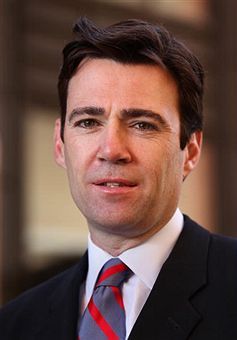 Whilst Ed Balls descends into bellicose self-caricature, Andy Burnham, the quiet man of this campaign, has written an incendiary article for the Guardian. It is subtly constructed: behind the veneer of his folksy idiom, Burnham
proclaims a self-conscious radicalism. He has sharpened some of the ideas expressed so loosely in his pamphlet Aspirational
Socialism. He advocates the adoption of land value tax, the abolition of inheritance tax and a very tough Blairite stance on crime and the causes of crime. He angrily dismisses the Milibands as
thoughtless ‘comfort zone’ politicians, both stuck dumb in a trance to the mantra of ‘tax and spend’.
Whilst Ed Balls descends into bellicose self-caricature, Andy Burnham, the quiet man of this campaign, has written an incendiary article for the Guardian. It is subtly constructed: behind the veneer of his folksy idiom, Burnham
proclaims a self-conscious radicalism. He has sharpened some of the ideas expressed so loosely in his pamphlet Aspirational
Socialism. He advocates the adoption of land value tax, the abolition of inheritance tax and a very tough Blairite stance on crime and the causes of crime. He angrily dismisses the Milibands as
thoughtless ‘comfort zone’ politicians, both stuck dumb in a trance to the mantra of ‘tax and spend’.
Burnham’s aides must be as aghast as me because they are incapable of answering the phone. Has a Labour politician with such obvious working class roots called for the abolition of inheritance tax in favour of a 10 percent levy on all estates to pay for care for the elderly? Has that same politician averred that the tax system needs urgent simplification? Is a Labour politician finally interested in the aspirational voters of middle England? It seems he is.
As far as I can gather, land value tax is not a wealth tax; it would benefit middle England. Levied according to accurate market rental rates rather than unrealised capital value, it taxes property fairly. For example, absentee homeowners pay through the nose for their mansions near Regent’s Park, whilst the owners of cheaper or worthless parcels of land in suburbia and rural Britain pay less. You cannot hide your beautiful Nash stucco or its title deeds, so the tax cannot be avoided. It also pays siginificant economic dividends. It would encourage developers to build in less affluent areas – stimulating local economies and extending home ownership by means other than a credit bubble, which might limit speculative property booms. It could also herald the abolition of stamp duty, an extra cost that is the difference between renting and buying for many at the bottom of the housing ladder. The Land Value Tax Campaign claims that LVT would bring reductions in VAT and council tax. I’m sceptical but it must be possible, and such a development would benefit middle England: the VAT on the fuel that drives suburban and rural Britain and its commerce is cripplingly expensive. As for council rates – palaces in Putney currently attract less tax than squats in Brixton, a situation that should be reversed and, of course, it is surely a good thing if the bill attached to each property is decreased. So too with inheritance tax – a 10 percent levy on all estates to ensure that you don’t have to pay as much to care for your infirm parents is infinitely preferable to paying 40 percent on what is left after the extortionate but necessary care homes.
Anything that encourages affluence and aspiration, which puts more money in the pockets of hard working people, is commendable. These aspects of Burnham’s ‘aspirational socialism’ are a fresh alternative to the tired tenets of new and old Labour; they strike me as nearly conservative.






Comments